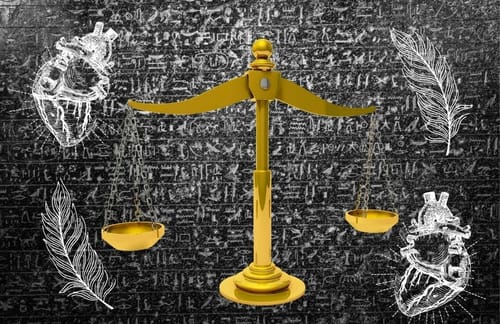The heart is an organ often synonymous with words like love, compassion and acceptance. However, according to Egyptian mythology, when it comes to determining one’s fate in the afterlife, not all hearts weigh the same.
Ancient Egyptians believed the heart to be a sacred record-keeper, holding all deeds committed in a lifetime, representing the purity of an individual—or lack thereof. Whether or not a person would make it past the Underworld and into everlasting paradise solely depended on the results of the weighing of the heart ritual.
Passing the scales of judgment
Funerary customs in ancient Egypt were deeply feared and highly respected as it was said that a heavy heart riddled with sin would not continue in the afterlife. In the transitory stage of life and death, a ceremony would take place. The individual who passed away would be asked if they had committed any wrongdoings or broken any laws. Depending on their response, judged by the dead, the voice of truth would ring, and they’d be able to continue to the next stage—the weighing of the heart.
This was the most critical part of the ceremony since the results would dictate whether a person would cross into everlasting paradise. In this segment, a scale would measure the weight of a heart against the weight of goddess Maat’s feather of justice and truth. If the heart was as light as a feather, the person would have proved to live a good and honest life. Thus, crossing over into paradise and the Land of Two Fields, a place of everlasting joy where the dead could reunite with loved ones.
If a person’s heart weighed more than Maat’s feather, they’d reside in the Underworld for all of eternity. Finally, their heart would get eaten by the crocodile-headed goddess, Ammut.
The heart is the key to the afterlife
The heart was deeply revered in ancient Egypt and would constitute as the only organ that would remain in the body during mummification. Of course, if a person’s heart was heavier than Maat’s feather, it’d end up in the abyss of Ammut’s stomach. All other organs were removed and packed in natron to dry out. Keeping the heart intact and in the body during preservation was a central figure in proper preparation for the aftrerlife.
The heart is the inner compass that can be strenghtened and cultivated through experiences and gained wisdom. Leading a life from the heart, according to ancient Egyptians, requires actions based in the principles of Maat, the goddess of harmony.
In the pursuit of keeping a pure heart, people were encouraged to take note of the thoughts fed and the actions led for sins were defined as anything that went against Maat’s law of harmony. In this case, covetous, a lack of ingratitude, marked the worst of all sins for it went against Maat.
In an excerpt from one of the oldest text, the Instruction of Ptah-hotep:
“If you desire your conduct to be good, to set yourself free from all evil, then beware of covetousness which is an incurable disease. It is impossible to be intimate with it; it makes the good friend bitter, it alienates the trusted employee from his master, it makes bad both the father and the mother, together with the mother’s brothers, and it divorces a man’s wife…Do not be covetous regarding division [when food or goods are dispensed between you and others] and do not be exacting with regard to what is due to you. Do not be covetous towards your family”
(David, 132)
A covetous heart would mark the heaviest of all—one of an insatiable desire destined to selfishness, jealousy, self-pity and ingratitude.
The ancient Egyptians practice of weighing the heart ensured those moving forward and onto paradise would have the tools needed to navigate the afterlife—through love, wisdom, patience and acceptance.
